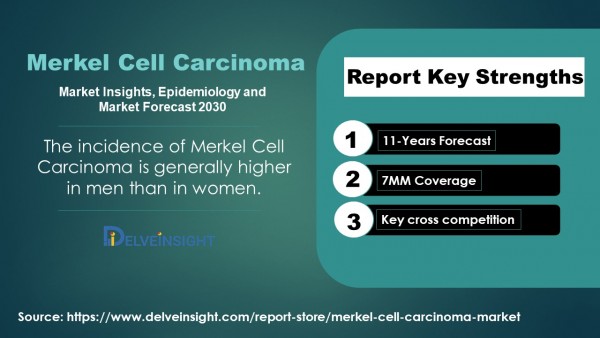Merkel Cell Carcinoma (MCC) is a rare, highly aggressive neuroendocrine cutaneous neoplasm with a variable clinical presentation. It is a predominantly dermal-based lesion composed of monotonous small round cells with scanty cytoplasm, often difficult to differentiate from small round cell tumours, metastatic small cell carcinoma, blastic hematologic malignancies, and melanoma.
It is caused by ultraviolet (UV) light exposure, infection with HIV virus, autoimmune diseases (rheumatoid arthritis), and certain malignancies like chronic lymphocytic leukaemia or lymphomas, which can profoundly suppress the immune system and may act as a causative agent in MCC. It is also associated with Merkel cell polyomavirus in more than 80% of cases.
DelveInsight’s “Merkel Cell Carcinoma Market Report 2030“ report delivers an in-depth understanding of the Merkel Cell Carcinoma, historical and forecasted epidemiology as well as the Merkel Cell Carcinoma market trends in the United States, EU5 (Germany, Spain, Italy, France, and United Kingdom) and Japan.

Geography Covered:
The United States, EU5 (Germany, France, Italy, Spain, and the United Kingdom) & Japan
Merkel Cell Carcinoma Disease Understanding and Treatment Algorithm
In most people, the first sign of Merkel cell carcinoma is a small bump (nodule) on the skin. This bump is usually firm and appears either skin-coloured or red-purple. It also tends to grow rapidly. Often, there no symptoms associated with the nodule.
Based on the American Joint Committee, MCC is divided into 4 stages, stage I tumour size of ≤2 cm, and stage II >2 cm, stage III as regional nodal disease, and stage IV as metastatic disease.
The incidence of MCC is generally higher in men than in women.
Surgery is the primary treatment option for patients with loco-regional primary MCC. At all stages of MCC, physicians recommend complete excision of the primary tumour, verified by pathologic examination, after excision, if the risk of recurrence to the local lymph nodes is high, it is recommended that the lesion should be treated with a course of radiation therapy. This may destroy any cancer cells that are not detectable by physical exam and can help prevent recurrence of the disease. MCC is generally considered to be a chemotherapy-sensitive tumour, but responses are seldom durable.
Chemotherapy is reserved for the treatment of metastatic MCC (stage IV), and there is a growing opinion that it is mostly indicated to palliate symptoms. Commonly used regimens include. Adjuvant radiation therapy was associated with better outcomes compared with adjuvant chemotherapy.
The choice of treatment depends on the location of the tumour and comorbidities, highlighting the acute unmet need for effective treatment options with good safety and tolerability profile.
View full report @ https://www.delveinsight.com/report-store/merkel-cell-carcinoma-market
Merkel Cell Carcinoma Epidemiology
Key Findings
1. As of 2015, approximately 2500 persons per year are diagnosed with this cancer in the United States.
2. It dramatically increases approximately to 9.8 people per 100,000 in individuals more than 85 years of age.
3. There is a 100,000-fold difference between the risks of developing MCC for patients under the age of 30 compared to those who are greater than 85 years old.
Merkel Cell Carcinoma Emerging Therapies
1. Nivolumab by Bristol-Myers Squibb
2. INCMGA00012 by Incyte corporation
3. KRT 232 by Kartos Therapeutics
4. haNk and aNK cell therapies by NantKwest
Table of contents
1 Key Insights
2 Executive Summary of Merkel Cell Carcinoma (MCC)
3 Merkel Cell Carcinoma (MCC) Market Overview at a Glance
4 Disease Background and Overview: Merkel Cell Carcinoma (MCC)
5 Case Reports
6 Merkel Cell Carcinoma (MCC) Epidemiology and Patient Population
7 United States Epidemiology
8 EU5 Epidemiology
9 Japan Epidemiology
10 Current Merkel Cell Carcinoma (MCC) Treatment and Medical Practices
11 Unmet needs
12 Merkel Cell Carcinoma (MCC) Marketed Drugs
13 Merkel Cell Carcinoma (MCC) Emerging Drugs
14 Merkel Cell Carcinoma (MCC) 7MM Market Analysis
15 United States
16 EU-5 countries: Market Outlook
17 Japan Market Outlook
18 Merkel Cell Carcinoma (MCC) Market Drivers
19 Merkel Cell Carcinoma (MCC) Market Barriers
20 SWOT Analysis
21 Reimbursement and market access
22 Appendix
23 DelveInsight Capabilities
24 Disclaimer
25 About DelveInsight
Related reports:
• Merkel Cell Carcinoma Pipeline Insight, 2020
• Merkel Cell Carcinoma Epidemiology Forecast to 2030
About DelveInsight:
DelveInsight is a leading Business Consultant, and Market Research Firm focused exclusively on life sciences. It supports pharma companies by providing end to end comprehensive solutions to improve their performance.
Contact us:
Shruti Thakur
info@delveinsight.com
+919650213330
Media Contact
Company Name: DelveInsight Business Research LLP
Contact Person: Kritika Rehani
Email: Send Email
Phone: 9193216187
Address:304 S. Jones Blvd #2432
City: Las Vegas
State: Nevada
Country: United States
Website: https://www.delveinsight.com/

